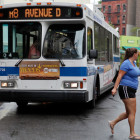Richmond Terrace, the bumpy former cow path that is the main road along Staten Island’s North Shore, starts at the St. George Ferry Terminal and winds past dozens of storage lots, old factories, transfer stations, high sheet-metal fences and, occasionally, a park. Six miles later, just east of the Goethals Bridge, it reaches its end among heavy trucks and stacked shipping containers at the Howland Hook Marine Terminal.The port, operated on public land by New York Container Terminal, a private company, is one of Staten Island’s largest businesses. The company, officials said, has a $53 million payroll and more than 550 employees, unloading around 400,000 shipping containers a year. But that, company officials and their allies in government say, is not big enough.









